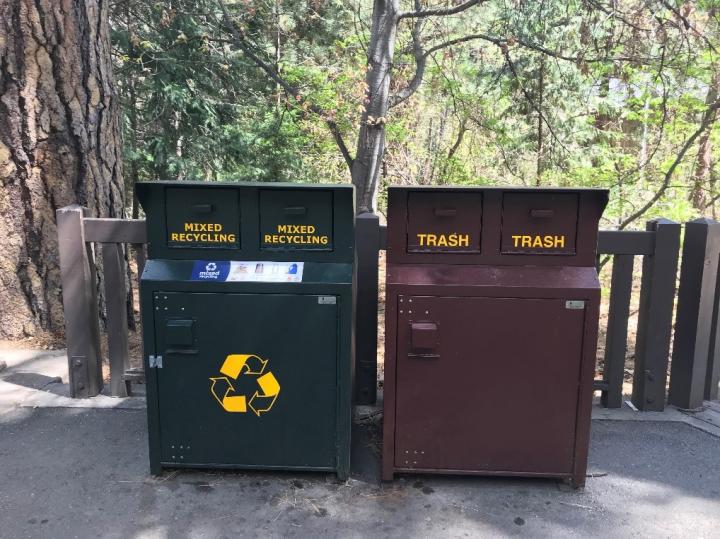
Credit: Zach Miller/Utah State University
When you think of national parks, you might picture the vast plateaus of the Grand Canyon, the intricate wetlands of the Everglades, or the inspiring viewscapes of the Grand Tetons. You probably don’t envision 100 million pounds of mashed water bottles, barbecue-smudged paper plates, and crumpled coffee cups – but that is the staggering quantity of garbage that is generated in our National Parks each year. And handling that amount of waste is becoming a huge problem.
The quantity of waste produced and how park visitors dispose of it (recycling some materials) is a growing concern for park managers. Handling park waste costs money, involves significant effort, and requires human and natural resources that tax parks to the extreme. And with numbers of visitors increasing, managers are looking for strategies to increase diversion of recyclable materials from landfills and reduce the overall amount of waste produced in national parks.
“Many park managers prefer to take a light-handed approach to these kind of challenges – using strategies like better communication rather than enforcement,” said Zach Miller from the Institute of Outdoor Recreation and Tourism at USU, and lead author on recently published research on this topic. “This style of management requires fewer resources, leaves visitors happier, and matches the independent park experience people are seeking in these places.”
Waste management has been studied in urban settings, but it is new territory for national parks. That’s why the Leave No Trace Center for Outdoor Ethics, the organization leading the Zero Landfill Initiative research project, reached out to Miller and Dr. Derrick Taff at Penn State University to collaborate on studies in three national parks to better understand what kinds of strategies might work to reduce the amount of waste generated in parks while also diverting more recyclable materials away from landfills.
Yosemite, Grand Teton, and Denali National Parks were used as field sites for this study. These iconic parks host millions of visitors each year, and offer stunning flora and fauna, iconic viewscapes, and historic park infrastructures. Each park unit faces unique waste management challenges, and different waste processing and diversion processes (e.g. single stream recycling, source separated recycling, etc.).
There are definable reasons people choose to drop their soda can in a recycling bin rather than a trash can … moral beliefs, peer pressure, convenience … and reasons people choose not to recycle. In the survey, Miller and colleagues worked to pinpoint exactly what held people back. They found two issues that had a significant impact on behavioral intentions related to waste: moral norms and perceived difficulty.
“Perhaps the most important finding from this research is that people’s perceptions and reported behaviors are largely in line with proper disposal of waste and recyclable materials,” said Ben Lawhon, lead researcher with the Leave No Trace Center. “Many visitors are predisposed to be environmentally responsible and follow behaviors that benefit and protect national parks. Parks need to reinforce messages of moral responsibility and make it easy for them to dispose of waste properly.”
###
Media Contact
Zachary Miller
[email protected]
Related Journal Article
http://dx.




